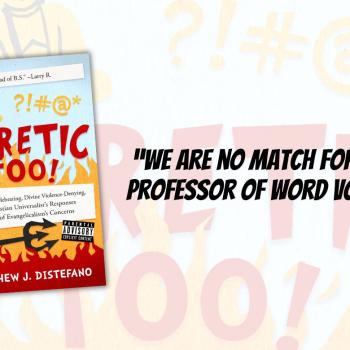
A few months ago, author Kevin DeYoung posed forty questions to those, like me, who are inclusive and affirming of the LGBT community and who supported this year’s SCOTUS decision on marriage equality. I know his article, which went viral so to speak, is not as relevant as when it was first published, but because so many of my Christian brothers and sisters are still in the mindset that the Bible dogmatically defines marriage, that homosexuality is synonymous with sin, and that our view as Christians is to “defend traditional marriage,” I thought it would still be relevant to offer my voice in this matter. With that being said, let’s move on to answering some questions, shall we?
*Note: DeYoung’s questions are in standard font, while my answers are in bold font.
Q1: How long have you believed that gay marriage is something to be celebrated?
A1: The length of time that someone holds a belief is completely irrelevant. If we are living in the spirit of metánoia, then we will constantly be changing our minds. That is what the Greek word we translate to “repent” means anyway.
Q2: What Bible verses led you to change your mind?
A2: It is not necessarily a specific verse that led me to change my mind about this issue, as if simply reading something new through the same old lens would lead to real change anyway. Repentance is a posture, but does not come from simply learning new information or reading a Bible verse that you may have previously missed. But if I must provide an answer, any of the “love” passages would do.
Q3: How would you make a positive case from Scripture that sexual activity between two persons of the same sex is a blessing to be celebrated?
A3: Again, I don’t resort to merely using the Scriptures in defining every behavior. If I did, I would have no direct Biblical command to denounce the institution of slavery in the same way we would today, for instance. Sure, there are passages we can creatively use to argue for denouncing that practice, but there is not one passage that openly condemns it. That said, if I did have to make a “biblical case” for celebrating a loving, same-sex union, I would go right to the Sermon on the Mount. I would follow the same hermeneutical method as my Rabbi and employ a bit of Midrash. Perhaps I would say something like: “You have heard that it was said: If a man lies with a male as with a woman, both of them have committed an abomination; but I say to you, have love in your hearts and be committed to fellowship, unity, fidelity, and peace.”
Q4: What verses would you use to show that a marriage between two persons of the same sex can adequately depict Christ and the church?
A5: I could point to any one of the passages about how we are to conduct ourselves in relationship to one another. I could point to Ephesians 5:25—yes, even in spite of the fact that it is used as a proof-text for “traditional” marriage. One can plainly understand that two men or two women can love each other in the same manner as the self-giving Christ loves his bride, which, as blogger Susan Cottrell points out, includes men. At minimum, same sex couples wouldn’t fail at loving each other like Christ any worse than heterosexual couples would. We all fall short after all, as Paul aptly noted (Romans 3:23). When discussing Christ and his love for the church, we must talk about a love that transcends gender. As Paul writes, “There is no longer Jew or Greek, there is no longer slave or free, there is no longer male or female; for all of you are one in Christ Jesus.” (Galatians 3:28—my emphasis) Furthermore, if I wanted to really talk about love, I could rather predictably point to 1 Corinthians 13. There is no reason to believe a same sex couple couldn’t love in these ways. Are you suggesting otherwise?
Q5: Do you think Jesus would have been okay with homosexual behavior between consenting adults in a committed relationship?
A5: Considering he never spoke on the manner, I would only be able to speculate. To be fair, so would you. Thus, we are both a little hamstrung here. That being said, I do not see how a loving homosexual relationship violates Jesus’ command to “love one another just as I have loved you.” (John 13:34) Also, and I don’t mean to be distracting here, but I believe Jesus would be more concerned with A) non-consenting sexual behavior between two adults and, sicker yet, adults and children, B) the culture’s cheapening of sex in general, regardless of homosexual or heterosexual, and C) the perpetual sexual abuse against women.
Q6: If so, why did he reassert the Genesis of definition of marriage as being one man and one woman?
A6: He quotes from Genesis because he is asked a specific, and might I say, loaded question from some Pharisees. A word of advice: A text without context is a pretext. Or, better yet, to quote Jared Saul McKenna: “A text without a pretext is a con.”
Q7: When Jesus spoke against porneia what sins do you think he was forbidding?
A7: There are twenty-five instances in the NT where porneia or a derivation thereof is used. I think some context to this question would be in order, as I feel like whatever answer I provide will be a set up for an upcoming hammer of a question.
Q8: If some homosexual behavior is acceptable, how do you understand the sinful “exchange” Paul highlights in Romans 1?
A8: And boom goes the dynamite! My guess is you and I will not see eye to eye on how to read Romans 1–4. You seem to read Romans 1:18–32 as the voice of Paul. I, on the other hand, side with Douglas Campbell, J. Louis Martyn, Chris Tilling, et al, and believe that passage depicts the voice of the false teachers in Rome that Paul is arguing against. Thus, in my opinion, you are taking the side of the false teacher. In Romans 2:1, then, Paul immediately counters this: “Therefore you have no excuse, whoever you are, when you judge others; for in passing judgment on another you condemn yourself, because you, the judge, are doing the very same things.” Paul said it, I only agree with him.
Q9: Do you believe that passages like 1 Corinthians 6:9 and Revelation 21:8 teach that sexual immorality can keep you out of heaven?
A9: As a Calvinist, you should know better than anyone that nothing “keeps you out of heaven” if you are elected by God. And I would agree with you that there is no sin that is greater than God’s grace and that salvation is by grace alone. But I’m not going to get into soteriology and eschatology at this time. In 1 Corinthians 6:9, though, is Paul talking about “going to heaven?” or rather, “the kingdom of God?” Luke 17:21 tells us that the kingdom of God is among you. Matthew 3:2 teaches that the kingdom of heaven is at-hand. To that end, I don’t believe this passage is about going to some place when you die, rather, it is about how we live now. As for the Revelation 21:8 passage . . . we would be so far off in terms of how we read the book of the Revelation that I do not have the time nor the space to discuss this passage here. What I will say is that the gates of heaven never close and that the Spirit and the bride of Christ never cease inviting everyone who is thirsty to “come.”
Q10: What sexual sins do you think they were referring to?
A10: Given the cultural context of Paul’s day, what he is most likely referring to is non-consensual sex and sexual promiscuity in general. Paul is in no way speaking about loving, monogamous, committed unions. That is just not found in the context. To suggest otherwise would be to engage in a straight-up anachronism.
Q11: As you think about the long history of the church and the near universal disapproval of same-sex sexual activity, what do you think you understand about the Bible that Augustine, Aquinas, Calvin, and Luther failed to grasp?
A11: First, let us not make the mistake of fallaciously “appealing to authority.” Just because these theologians made great contributions does not mean that they A) got everything about Scripture correct, B) agreed on everything vis-à-vis the Bible, C) always had Christlike social ethics or D) possessed any knowledge about LBGT issues. Again, the sociological concept of “homosexual” was not something that was developed until after the Enlightenment, so how could pre-Enlightenment thinkers comment on something like this?
Q12: What arguments would you use to explain to Christians in Africa, Asia, and South America that their understanding of homosexuality is biblically incorrect and your new understanding of homosexuality is not culturally conditioned?
A12: Don’t assume that this view I hold is “new” or simply derived by my culture. It is possible that we define the authority of Scripture differently and that our hermeneutical approach is also dissimilar. And please don’t assume that those living in Africa, Asia, and South America are not “culturally conditioned” themselves. And by the way, if these Christians are not conditioned by predominantly conservative Evangelical missionaries, just who then, pray tell, do you suppose they are “culturally conditioned” by? The Lord Jesus himself? C’mon man, you should know better.
Q13: Do you think Hillary Clinton and Barack Obama were motivated by personal animus and bigotry when they, for almost all their lives, defined marriage as a covenant relationship between one man and one woman?
A13: I would be a fool to speak on behalf of two people I’ve never met.
Q14: Do you think children do best with a mother and a father?
A14: I think this is rather distracting. I am not a psychologist but I would imagine the better question is: do you think children do best with loving or abusive parents?
Q 15: If not, what research would you point to in support of that conclusion?
A15: Again, it is possible that children would do great with a mother and father. I cannot emphasize enough, however, the importance of having loving parents. I worked in youth group homes for roughly seven years and consistently, children were placed with us due to their having unloving and often abusive parents, not because their parents were gay.
Q16: If yes, does the church or the state have any role to play in promoting or privileging the arrangement that puts children with a mom and a dad?
A16: I am not sure how the state plays any role in the kingdom of God. Full Stop. I think the role the church should play is to help broken children find loving homes, regardless of the parents’ or foster parents’ sexual preference.
Q17: Does the end and purpose of marriage point to something more than an adult’s emotional and sexual fulfillment?
A17: Of course you know it does! What are you suggesting with this question? Honestly, it shows such a level of immaturity I do not care to waste much energy on it.
Q18: How would you define marriage?
A18: How I define marriage is not really that important but I would probably be fine with your definition. However, unlike you, I wouldn’t discriminate against allowing someone to partner with another of the same sex.
Q19: Do you think close family members should be allowed to get married?
A19: Are we heading toward a slippery slope fallacy?
Q20: Should marriage be limited to only two people?
A20: This is a red herring. That said, I’m open to having a conversation about that. As one who studies mimetic theory, I’d caution folks considering it though.
Q21: On what basis, if any, would you prevent consenting adults of any relation and of any number from getting married?
A21: I thought we would be at the bottom of this slippery descent by now.
Q22: Should there be an age requirement in this country for obtaining a marriage license?
A22: Yes but how is this related? You like your red herrings, don’t you?
Q23: Does equality entail that anyone wanting to be married should be able to have any meaningful relationship defined as marriage?
A23: How many logical fallacies are we at yet?
Q24: If not, why not?
A24: See Answer 23.
Q25: Should your brothers and sisters in Christ who disagree with homosexual practice be allowed to exercise their religious beliefs without fear of punishment, retribution, or coercion?
A25: Of course. Why, is retribution only reserved for the Almighty *wink wink?
Q26: Will you speak up for your fellow Christians when their jobs, their accreditation, their reputation, and their freedoms are threatened because of this issue?
A26: I try to meet each situation with an open mind and heart, not wanting to be flippant about what I choose to support and what I choose to speak out against. I believe this question is far too loaded for me to properly answer.
Q27: Will you speak out against shaming and bullying of all kinds, whether against gays and lesbians or against Evangelicals and Catholics?
A27: Yes, I will try.
Q28: Since the evangelical church has often failed to take unbiblical divorces and other sexual sins seriously, what steps will you take to ensure that gay marriages are healthy and accord with Scriptural principles?
A28: My job is to love my neighbor as myself and to love God. I would hope that I have enough integrity to love and council homosexual marriages in the same way I do heterosexual ones, should the opportunity arise.
Q29: Should gay couples in open relationships be subject to church discipline?
A29: If a church has disciplinary measures, then all discipline should be consistent across the board. However, I cringe at the phrase “church discipline,” due to the abuses I have witnessed, experienced, and heard testified about.
Q30: Is it a sin for LGBT persons to engage in sexual activity outside of marriage?
A30: I cannot tell, as the log in my own eye prevents me from seeing their speck. But seriously, what does one’s sexuality have to do with it?
Q31: What will open and affirming churches do to speaking prophetically against divorce, fornication, pornography, and adultery wherever they are found?
A31: How more prophetic can one be, then to model in their own lives the joy found from discovering the Christ within them? With this joy, with a posture toward Christ, with a heart focused on the positives following the risen Christ brings, sin no longer becomes the focus. There seems to be an abundance of effort placed by you in naming all these sins, rather than talking about living a life postured toward Christ and his unconditional love.
Q32: If “love wins,” how would you define love?
A32: I do that in a poem entitled “Love is . . .” You can read it here.
Q33: What verses would you use to establish that definition?
A33: Matthew 5:43–48, Luke23:34, John 15:13, 1 Corinthians 13, and so many others.
Q34: How should obedience to God’s commands shape our understanding of love?
A34: We are commanded to love God and neighbor, which, as Paul writes, “fulfills the law.” (Romans 13:8)
Q35: Do you believe it is possible to love someone and disagree with important decisions they make?
A35: It is a requirement in following Jesus as he calls us to love even our enemies.
Q36: If supporting gay marriage is a change for you, has anything else changed in your understanding of faith?
A36: As I said in my first answer, I am constantly changing my mind about God because I attempt to live in the spirit of metánoia.
Q37: As an evangelical, how has your support for gay marriage helped you become more passionate about traditional evangelical distinctives like a focus on being born again, the substitutionary sacrifice of Christ on the cross, the total trustworthiness of the Bible, and the urgent need to evangelize the lost?
A37: First, I don’t know one person who would define me as an evangelical. Second, I don’t focus on what we in the West call “being born again,” but rather, on following the Way of Jesus. Third, I take issue with penal substitutionary atonement theory here, here, and here. Fourth, I discuss the Bible here, here, and here. Fifth, what I find urgent is discovering how to live peacefully before it is too late and humanity hits the proverbial “red button.” I discuss this briefly here.
Q38: What open and affirming churches would you point to where people are being converted to orthodox Christianity, sinners are being warned of judgment and called to repentance, and missionaries are being sent out to plant churches among unreached people?
A38: Talk about a question that takes an adventure in missing the point.
Q39: Do you hope to be more committed to the church, more committed to Christ, and more committed to the Scriptures in the years ahead?
A39: Yes.
Q40: When Paul at the end of Romans 1 rebukes “those who practice such things” and those who “give approval to those who practice them,” what sins do you think he has in mind?
A40: See answer #8.













